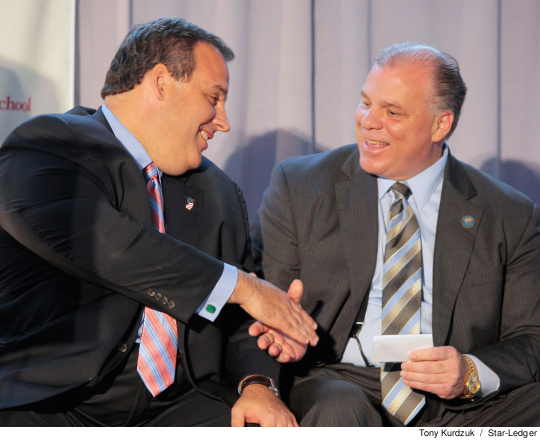 |
In June, New Jersey became the latest state to pummel its public employees when legislators adopted a new law limiting workers’ collective bargaining rights and making them pay far more for their benefits. Democratic legislative leaders united with Republican Governor Chris Christie to enact the anti-union bill.
New Jersey Governor Chris Christie (left), a Republican, teamed up with Democratic State Senate President Stephen Sweeney (right) to pass anti-union legislation.
Under the plan, the right of public workers to bargain over healthcare was rescinded for four years. Instead, dramatic cost increases will be imposed on them. New Jersey public workers currently pay 1.5% of their salaries to health insurance. Going forward, they will be required to pay a steadily increasing percentage of their insurance premiums. By the fourth year of the plan, they will have to pay anywhere from 3% to 35% of their insurance premiums for family health coverage, depending on their income.
COSTLY
According to Communications Workers of America District 1, which represents most state employees in New Jersey, public employees making $45,000 per year will have to pay 9% of their premium for family coverage and will see the cost of coverage grow from $675 per year at present to $1,710. A public employee earning $65,000 per year will have to pay 19% of premium for family coverage – $3,610 compared to $975 per year at present.
The rollback of bargaining rights has broader implications than just increased costs, NJ union officials said. “Under current state law, in a contract impasse, a governor or mayor can go through a series of steps and impose terms on most employee groups – on every issue except health care,” reported The New York Times. “If you take away health care bargaining, you take away bargaining,” the CWA’s state director, Hetty Rosenstein, told the Times. “It’s the only leverage we have.”
The new law also requires public workers to contribute 2% more of their salary toward their pensions while increasing the retirement age and suspending cost-of-living increases for current and future retirees for as long as 30 years. According to Salon.com, the measure could save the state $120 billion over those three decades while costing the average public employee thousands of dollars per year.
The measure was championed by Gov. Christie, who has become notorious for his hostility toward teachers and other public-sector workers. Unlike Republican governors in Wisconsin, Michigan, and Ohio who have pushed through anti-union initiatives, Christie’s push won support from Democratic legislative leaders, including both State Senate President Stephen Sweeney and Assembly Speaker Sheila Oliver. Democrats hold majorities in both houses of the New Jersey State Legislature; about one-third of the Democrats in each house sided with Christie against the unions.
More than 8,000 union workers protested in Trenton on the day of the vote, the Newark Star-Ledger reported, in their third large protest within two weeks. They marched behind a New-Orleans-style funeral procession in which a black hearse carried “the soul of the Democratic Party,” and chanted “Shame on you!” from the gallery when the bill was passed.
‘DARK DAYS’
“This is a dark day for workers’ rights as the race to the bottom continues,” said CWA President Larry Cohen after the measure was approved on June 23. The NJ branch of the American Federation of Teachers said the bill was “part of a coordinated right-wing campaign to suppress wages and workers’ rights.”
Hetty Rosenstein, the union’s state director, said that New Jersey’s Democratic Party “has abandoned the middle class and its own core values,” and unions vowed electoral retribution against Democrats who voted against union rights. “Remember this November!” said a CWA message to members.
‘REPUBLICRATS’
“You don’t know who’s who anymore. We call them Republicrats,” said Elvin Padilla, the outgoing president of Local 10 of the Firefighters Mutual Benevolent Association Local 10 in Orange, New Jersey.
Padilla said the Democratic support for anti-union legislation largely came from the southern part the state where wealthy insurance magnate George Norcross III controls the local Democratic Party machine. Norcross (“a good friend of Donald Trump,” according to Salon) has allied himself with Christie, and his north Jersey ally, Essex County Executive Joe DiVincenzo, also backed the bill. Only one Democratic legislator independent of these two party bosses voted for the measure.
Padilla told Clarion that the firefighters’ union had been willing to make concessions short of giving up its rights, but was rebuffed when it sought a meeting with Gov. Christie. He said the same thing happened at the local level in Orange, where the mayor refused to meet with representatives of public sector unions to discuss givebacks they were willing to offer. Instead, 76 out of approximately 300 public employees were laid off in January, including police and firefighters.
READY TO TALK
“It was disheartening,” said Donna K. Williams, a member of the Orange City Council who works as a legal assistant at the PSC central office. “He didn’t give them an opportunity to bring their solutions to the table. Instead, solutions were imposed on them that might not have been necessary.” Williams added that some of the city’s cutbacks had not even saved money. For example, she said, the police layoffs led to short-staffing that forced an increase in overtime.
New York’s Gov. Andrew Cuomo is waging his own anti-union campaign – but he is not likely to follow Sweeney and Oliver’s example, says Kate Bronfenbrenner, director of Labor Education Research at Cornell. “Cuomo has national ambitions,” she told Clarion. “If he attacked collective bargaining, he wouldn’t be able to run for national office as a Democrat.” Bronfenbrenner said Cuomo had “tiptoed up to the line” of going after public employees’ collective bargaining rights but had not crossed it, choosing to rely on layoff threats and budget cuts instead.

